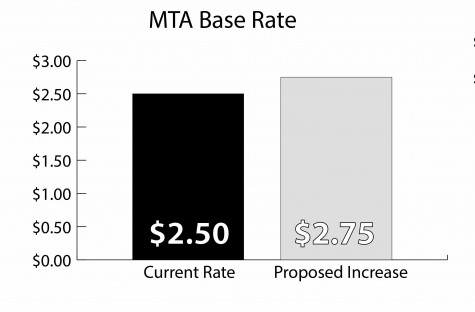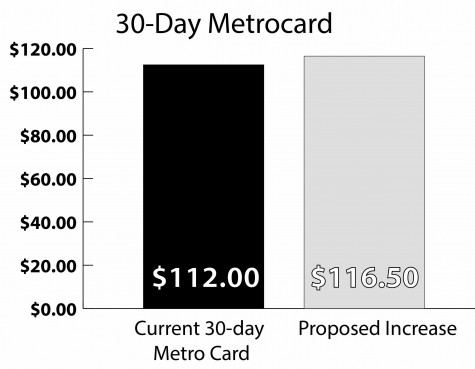Back in January, the Metropolitan Transportation Authority (MTA) announced a fare increase that will go into effect on March 22.
The current base fare for travel by both subway and bus is $2.50 and will be increased to $2.75.
The cost of a 30-day Metrocard will be raised by $4.50, up to $116.50, according to the New York Times.
The increase is one out of several in the MTA’s long-term financial plan. Fare increases are scheduled to occur every two years, and the last fare increase occurred in 2013, when the base fare went from $2.25 to $2.50.

In order to improve infrastructure, the MTA has proposed a $32 million five-year capital plan. The plan has a $15 million gap in funding and the MTA is seeking contributions from both the state and the city, according to the New York Times.
The increase in fares may help the MTA, but many who use public transportation will feel the effects. St. John’s has many commuter students who rely on public transportation to go to and from campus every day.
Catharine Mariampillai, a junior legal studies major, uses public transportation every day to get to campus.
She takes two buses each way to and from school, and only uses the subway if she’s going into Manhattan or somewhere else in Queens [besides campus].
Mariampillai said she buys an unlimited Metrocard because she uses public transportation to get to other places besides campus.
“Right now in my house, my dad is the only one who can drive, so whenever he’s at work the rest of my family depends on public transportation to get places. The increase doesn’t affect me as much because the unlimited [card] takes that care off of me,” Mariampillai said.
Mariampillai said that the fare increase will be a struggle for college students to deal with.
“I obviously don’t want the fares to keep going up, but I understand that they might need the money for their own budgetary reasons that I don’t know of,” Mariampillai said.
“If I decide to stay late on campus for work, or to study, or see some friends, I ask my dad to pick me up from campus,” she said.
Mariampillai said the fare increase would not likely lead to a change in her daily routine. “I don’t think I’d be so affected as to stop taking the bus. As they say, you have to
pay the piper. The bus is available for me whenever, so I do appreciate it. But I am learning to drive, so if worse comes to worst, I’ll be driving!”
Alex Genao, a junior history major, uses two buses daily to get to campus like Mariampillai.
Genao thinks that the fare increase is unfair.

“I’m completely disappointed with the potential fare increase because we already live in one of the most expensive cities in the world, and some people have trouble making ends meet. [And] to increase fare, that will only make matters worse.
“The fare increase would be more acceptable if the MTA improves its maintenance, but we haven’t seen any type of progress,” Genao said.
Genao said he will need to spend his money more wisely because of the fare increase.
“[I’ll have to] create a specific budget in order to have the opportunity to commute everyday to campus and have a little bit of money in my pocket,” Genao said.
Genao said he usually purchases the unlimited monthly Metrocard, which is currently $112.
Despite his complaint, Genao said taking public transportation is still the most convenient way for him to commute to campus.
“I come from the Bronx; if I drive, I would have to pay $7.50 in toll at the Whitestone Bridge,” Genao said.













